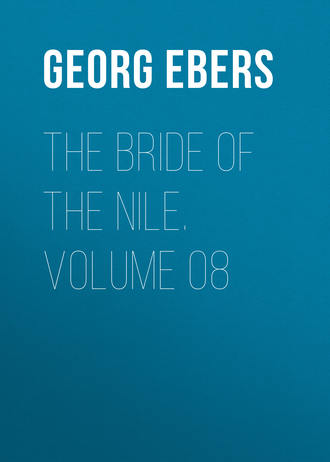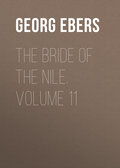
Georg Ebers
The Bride of the Nile. Volume 08
Setnau exchanged a meaning glance with his brother, who was a single man, and when it was also agreed that he, too, might embark on the sea-voyage he shook hands with Rufinus on the bargain. Then, giving himself a shake, as if he had thrown off something that cramped him, and sticking his leather cap knowingly on one side of his shaven head, he drew himself up to his full height and scornfully shouted back to the Arab—who had before now treated him and other Egyptian natives with insolent haughtiness—that if he wanted anything of him he might come and fetch it.
The Moslem's patience was long since exhausted, and at this challenge he signed to his followers and sprang first into the river; but the foremost horses soon sank so deep in the ooze that further advance was evidently impossible, and the signal to return was perforce given. In this manoeuvre a refractory horse lost his footing, and his rider was choked in the mud.
On this, the men in the boat could see the foe holding council with lively gesticulations, and the captain expressed his fears lest they should give up all hope of capturing the boat, and ride forward to Doomiat to combine with the Arab garrison to cut off their further flight. But he had not reckoned on the warlike spirit of these men, who had overcome far greater difficulties in twenty fights ere this. They were determined to seize the boat, to take its freight prisoners, and have them duly punished.
Six horsemen, among them the leader of the party, were now seen to dismount; they tied their horses up, and then proceeded to fell three tall palms with their battle-axes; the other five went off southwards. These, no doubt, were to ride round the morass, and ford the river at a favorable spot so as to attack the vessel from the west, while the others tried to reach it from the east with the aid of the palm-trunks.
On the right, or eastern shore, where the Arabs were constructing the raft, spread solid ground-fields through which lay the road to Doomiat; on the other shore, near which the boat was lying, the bog extended for a long way. An interminable jungle of papyrus, sedge, and reeds, burnt yellow by the heat of the sun and the extraordinary drought, covered almost the whole of this parched and baked wilderness; and, when a stiff morning breeze rose from the northeast, the captain was inspired with a happy thought. The five men who had ridden forward would have to force their way through the mass of scorched and dried up vegetation. If the Christians could but set fire to it, on the further side of a canal which must hinder their making a wide sweep to the north, the wind would carry it towards the enemy; and, they would be fortunate if it did not stifle them or compel them to jump into the river, where, when the flames reached the morass, they must inevitably perish.
As soon as the helmsman's keen eyes had made sure, from the mast-head, that the Arabs had forded the river at a point to the south, they set fire to several places and it roared and flared up immediately. The wind swept it southwards, and with it clouds of pale grey smoke through which the rising sun shot shafts of light. The flames writhed and darted over the baked earth like gigantic yellow and orange lizards, here shooting upwards, there creeping low. Almost colorless in the ardent daylight, they greedily consumed everything they approached, and white ashes marked their track. Their breath added to the heat of the advancing day; and though the smoke was borne southwards by the wind, a few cloudlets came over to the boat, choking the sisters and their deliverers.
A large vessel now came towards them from Doomiat and found the narrow channel barred by the other one. The captain was related to Setnau, and when Setnau shouted to him that they were engaged in a struggle with Arab robbers, his friend followed his advice, turned the boat's head with considerable difficulty, and cast anchor at the nearest village to warn other vessels southward bound not to get themselves involved in so perillous an adventure. Any that were coming north would be checked by the fire and smoke.
The six horsemen left on the eastern shore beheld the spreading blaze with rage and dismay; however, they had by this time bound the palm- trunks together, and were preparing by their aid to inflict condign punishment on the refractory Christians. These, meanwhile, had not been idle. Every man on board was armed, and one of the ship-wrights was sent on shore with a sailor, to steal through the reeds, ford the river at a point lower down and, as soon as the Arabs put out to the attack, to slaughter their horses, or—if one of them should be left to go forward on the road to Doomiat—to drag him from his steed.
The six men now laid hold of the slightly-constructed float, on which they placed their bows and quivers; they pushed it before them, and it supported them above the shallow water, while their feet only just touched the oozy bottom. They were all thorough soldiers, true sons of the desert and of their race—men whom nature seemed to have conceived as a counterpart to the eagle, the master-piece of the winged creation. Keen-eyed, strongly-knit though small-boned, bereft of every fibre of superfluous flesh on their sinewy limbs, with bold brown faces and sharply-cut features, suggesting the king of birds not merely by the aquiline nose, they had also the eagle's courage, thirst for blood, and greed of victory.
Each held on to the raft by one lean, wiry arm, carrying on the other the round bucklers on which the arrows that came whistling from the boat, fell and stuck as soon as they were within shot. They ground their white teeth with fury and nothing within ken escaped their bright hawk's eyes. They had come to fight, even if the boat had been defended by fifty Egyptian soldiers instead of carrying a score or so of sailors and artisans. Their brave hearts felt safe under their shirts of mail, and their ready, fertile brains under their brazen helmets; and they marked the dull rattle of the arrows against their metal shields with elation and contempt. To deal death was the wish of their souls; to meet it caused them no dread; for their glowing fancy painted an open Paradise where beautiful women awaited them open-armed, and brimming goblets promised to satisfy every desire.
Their keen ears heard their captain's whispered commands; when they reached the ship's side, one caught hold of the sill of the cabin window, their leader, as quick as thought, sprang on to his shoulders, and from thence on to the deck, thrusting his lance through the body of a sailor who tried to stop him with his axe. A second Arab was close at his heels; two gleaming scimitars flashed in the sun, the shrill, guttural, savage war-cry of the Moslems rent the air, and the captain fell, the first victim to their blood-thirsty fury, with a deep cut across the face and forehead; in a moment, however, a heavy spar sang through the air down on the head of the Moslem leader and laid him low. The helmsman, the brother of the fallen pilot, had wielded it with the might of the avenger.
A fearful din, increased by the shrieks and wailing of the nuns, now filled the vessel. The second Arab dealt death on all sides with the courage and strength of desperation, and three of his fellows managed to climb up the boat's side; but the last man was pushed back into the water. By this time two of the shipwrights and five sailors had fallen. Rufinus was kneeling by the captain, who was crying feebly for help, bleeding profusely, though not mortally wounded. Setnau had spoken with much anxiety of his wife and children, and Rufinus, hoping to save his life for their sakes, was binding up the wounds, which were wide and deep, when suddenly a sabre stroke came down on the back of his head and neck, and a dark stream of blood rushed forth. But he, too, was soon avenged: the old shipwright hewed down his foe with his heavy axe. On the eastern shore, meanwhile, the men charged to kill the Arabs' horses were doing their work, so as to prevent any who might escape from returning to Fostat, or riding forward to Doormat and reporting what had occurred.
On board silence now prevailed. All five Arabs were stretched on the deck, and the insatiate boatmen were dealing a finishing stroke to those who were only wounded. A sailor, who had taken refuge up a mast, could see how the other five horsemen had plunged into the bog to avoid the fire and had disappeared beneath the waters; so that none of the Moslems had escaped alive—not even that one which Fate and romance love to save as a bearer of the disastrous tidings.
By degrees the nuns ventured out on deck again.
Those who were skilled in tending the wounded gathered round them, and opened their medicine cases; as they proceeded on their voyage, under the guidance of the steersman, they had their hands full of work and the zeal they gave to it mitigated the torment of the heat.
The bodies of the five Moslems and eight Christians—among these, two of the Greek ship-wrights—were laid on the shore in groups apart, in the neighborhood of a village; in the hand of one of them the abbess placed a tablet with this inscription:
"These eight Christians met their death bravely fighting to defend a party of pious and persecuted believers. Pray for them and bury them as well as those who, in obedience to their duty and their commander, took their lives."
Rufinus, lying with his head on the gardener's knee, and sheltered from the sun under the abbess' umbrella, presently recovered his senses; looking about him he said to himself in a low voice, as he saw the captain lying by his side:
"I, too, had a wife and a dear child at home, and yet—Ah! how this aches! We may well do all we can to soothe such pain. The only reality here below is not pleasure, it is pain, vulgar, physical pain; and though my head burns and aches more than enough.—Water, a drink of water.—How comfortable I could be at this moment with my Joanna, in our shady house. —But yet, but yet—we must heal or save, it is all the same, any who need it.—A drink—wine and water, if it is to be had, worthy Mother!"
The abbess had it at hand; as she put the cup to his lips she spoke her warm and effusive thanks, and many words of comfort; then she asked him what she could do for him and his, when they should be in safety.
"Love them truly," he said gently. "Pul will certainly never be quite happy till she is in a convent. But she must not leave her mother—she must stay with her; Joanna-Joanna. . . ."
He repeated the name several times as if the sound pleased his ear and heart. Then he shuddered again and again, and muttered to himself: "Brrr!—a cold shiver runs all over me—it is of no use!—The cut in my shoulder.—It is my head that hurts worst, but the other—it is bad luck that it should have fallen on the left side. And yet, no; it is best so; for if he—if it had damaged my right shoulder I could not write, and I must—I must-before it is too late. A tablet and stylus; quick, quick! And when I have written, good mother, close the tablet and seal it—close and tight. Promise! Only one person may read it, he to whom it must go. —Gibbus, do you hear, Gibbus?—It is for Philippus the leech. Take it to him.—Your dream about a rose on your hump, if I read rightly, means that peace and joy in Heaven blossom from our misery on earth.—Yes, to Philippus. And listen my old school friend Christodorus, a leech too, lives at Doomiat. Take my body to him—mind me now? He is to pack it with sand which will preserve it, and have it buried by the side of my mother at Alexandria. Joanna and the child—they can come and visit me there. I have not much to leave; whatever that may cost. . . ."
"That is my affair, or the convent's," cried the abbess.
"Matters are not so bad as that," said the old man smiling. "I can pay for my own share of the business; your revenue belongs to the poor, noble Mother.—You will find more than enough in this wallet, good Gibbus. But now, quick, make haste—the tablets."
When he had one in his hand, and a stylus for writing with, he thought for some time, and then wrote with trembling fingers, though exerting all his strength. How acutely he was suffering could be seen in his drawn mouth and sad eyes, but he would not allow himself to be interrupted, often as the abbess and the gardener entreated him to lay aside the stylus. At last, with a deep sigh of relief, he closed the tablets, handed them to the abbess, and said:
"There! Close it fast.—To Philippus the physician; into his own hand:
You hear, Gibbus?"
Here he fainted; but after they had bathed his forehead and wounds he came to himself, and softly murmured: "I was dreaming of Joanna and the poor child. They brought me a comic mask. What can that mean? That I have been a fool all my life for thinking of other folks' troubles and forgetting myself and my own family? No, no, no! As surely as man is the standard of all things—if it were so, then, then folly would be truth and right.—I, I—my desire—the aim to which my life was devoted……"
He paused; then he suddenly raised himself, looked up with a bright light in his eyes, and cried aloud with joy: "O Thou, most merciful Saviour! Yes, yes—I see it all now. I thank thee—All that I strove for and lived for, Thou, my Redeemer who art Love itself—Ah how good, how comforting to think of that!—It is for this that Thou grantest me to die!"
Again he lost consciousness; his head grew very hot, his breath came hoarsely and his parched lips, though frequently moistened by careful hands, could only murmur the names of those he loved best, and among them that of Paula.
At about five hours after noon he fell back on the hunchback's knees; he had ceased to suffer. A happy smile lighted up his features, and in death the old man's calm face looked like that of a child.
The gardener felt as though he had lost his own father, and his lively tongue remained speechless till he entered Doormat with the rescued sisters, and proceeded to carry out his master's last orders. The abbess' ship took the wounded captain Setnau on board, with his wife, his children, his brother the steersman, and the surviving ship-wrights.
At the very hour when Rufinus closed his eyes, the town-watch of Memphis, led by Bishop Plotinus, appeared to claim the Melchite convent of St. Cecilia, and all the possessions of the sisterhood, in the name of the patriarch and the Jacobite church. Next morning the bishop set out for Upper Egypt to make his report to the prelate.






